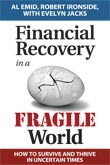Last updated: August 10 2011
Market Risk Management: Add a Tax Management Plan
There is much an astute financial advisor can do during a financial crisis. In fact, it's a great time for great advice. This is particularly powerful when tax and financial advisors work together to review the specific financial concerns their clients need to pay attention to in the short term, so that a strategy plan for disaster management can be put into place. This begins with family tax management.
"Tax and financial advisors following a Real Wealth Management ô approach can replace the financial jitters by developing a concrete action plan to manage potential financial disaster,î says Evelyn Jacks, president of Knowledge Bureau, which has pioneered the approach, featured in its designation programs. "A good place to start with is a comprehensive look at current tax filing habits to do three things: tap into missed refunds through prior errors and omissions, minimize penalties and interest caused by late filing, and increase both cash flow and investment returns with a tax efficiency plan for both income and capital.î
The following "baker's dozenî of do's and don'ts can start the process of tax management:
- Don't delay paying your balance due with CRA. The interest on the balance compounds daily at the prescribed annual rate of 5%. If you or your clients owe, best to clear it up. (It's not going to go away.)
- Do dig for errors on prior filed returns. Remind your clients that they can recover refunds on errors or omissions up to 10 years back (that's tax year 2001 until December 31). This is a good time to do so, to offset a current balance due, or, if in the clear with CRA, pay off credit card or other non-deductible debt.
- Do file your tax return. Clear that late return, as that interest clock will just keep ticking on the taxes due, the late filing penalties and the past interest accumulations. If you are a financial advisor, solicit the help of a tax advisor to speak to the collections department at CRA to arrange for your client to make payments over time, if the balance due is the reason for the filing avoidance.
- Tap into social benefits. Remind your clients that when income falls below certain ceiling levels, the family may begin receiving social benefits, such as Child Tax Benefits, for example. This won't happen until a tax return is filed, another reason to do so promptly.
- Don't overpay quarterly tax instalment payments. The next one is due September 15. Your clients probably have a pretty good idea of what their level of income will be by the end of 2011 and a formal estimation can help. If it will be less than 2010, the next two instalments may not be necessary. Work with a tax advisor on this.
-
Don't cash in RRSP deposits, if possible. This will simply cause a tax problem next year. Look for other sources to fund immediate bills, including CRA's.
-
Do an accrued gains balance review. Are there enough accrued gains in non-registered accounts, to offset loss selling today? Can you carry back unused losses, or do you expect to have capital gains in the future? Crystallizing losses during the current market volatility may not make sense otherwise.
ADDITIONAL EDUCATIONAL RESOURCES: Financial Recovery in a Fragile World
Available in December, 2011!

